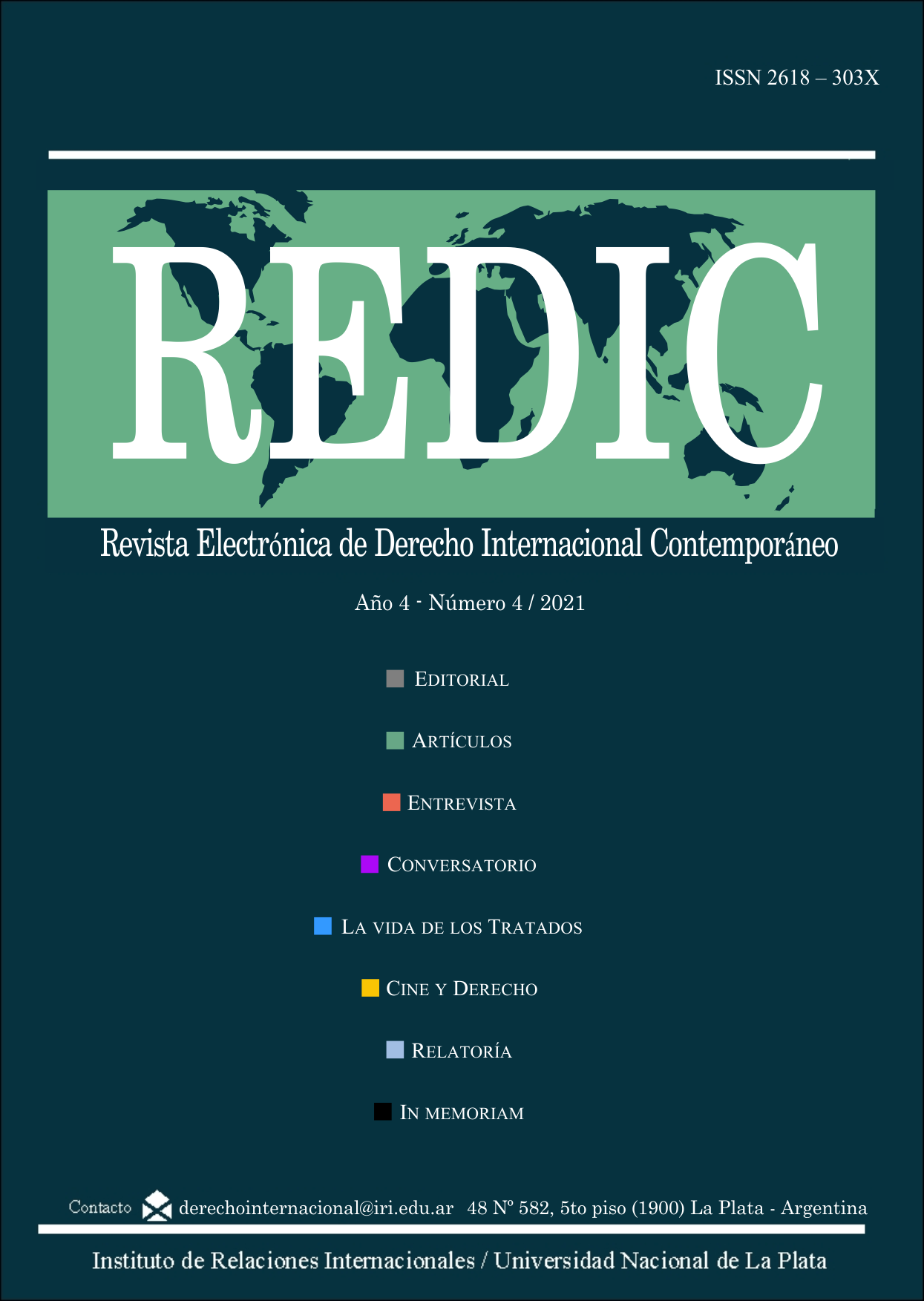Climate change in international law
DOI :
https://doi.org/10.24215/2618303Xe017Mots-clés :
climate change, international law, climate justice, multi-level conflictRésumé
Using a critical approach, this essay documents the principles of international law that have an impact on climate change. It then identifies the resources available to States and individuals to demand compliance with climate change obligations and assesses their chances of success. Finally, a new approach is put forward that would help solve conflicts more effectively.
Téléchargements
Références
Doctrine
Bodansky, D., Brunnée, J. and Rajamani, L. (2017). International Climate Change Law. Oxford University Press.
Clapham, A. (2006). Human Rights Obligations of Non-State Actors. Oxford University Press.
Corten, O. (2009). Méthodologie du droit international public. Éditions de l’Université de Bruxelles.
Crawford, J. (2012). Brownlie’s principles of Public International Law. 8th edition. Oxford University Press.
Papers
Ariani, D. (2019). The Effectiveness of Climate Change Litigation as a Venue to Uphold State Climate Change Obligations in Indonesia, Indonesian Journal of International Law, 16(2), 210-234.
Badrinarayna, D. (2018). A Constitutional Right to International Legal Representation: The Case of Climate Change, Tulane Law Review, 93(1), 47-104.
Barnes, K. (2019). Democratizing Climate Change: Litigation for the Era of Extreme Weather, The University of the Pacific Law Review, 50(4), 651-684. https://scholarlycommons.pacific.edu/uoplawreview/vol50/iss4/8
Benoît, M. (2019). Climate Assessment as an Emerging Obligation Under Customary International Law, International and Comparative Law Quaterly, 68(2), 271-308.
Blumm, M. C. and Wood, M.C. (2017). “No Ordinary Lawsuit”: Climate Change, Due Process, and the Public Trust Doctrine, The American University Law Review, 67(1), 1-87.
Byers, M., Franks, K. and Gage, A. (2017). The Internationalization of Climate Damages Litigation, Washington Journal of Environmental Law & Policy, 7(2), 264-319. https://digitalcommons.law.uw.edu/wjelp/vol7/iss2/3
Colombo, E. (2017). Enforcing International Climate Change Law in Domestic Courts: A New Trend of Cases for Boosting Principle 10 of the Rio Declaration, UCLA Journal of Environmental Law & Policy, 98-144.
Colombo, E., & Giadrossi, A. (2020). Comparative International Litigation and Climate Change: A Case Study on Access to Justice in Adaptation Matters, University of Pittsburgh Law Review, 81(3), 527-596.
Elborough, L. (2017). International Climate Change Litigation: Limitations and Possibilities for International Adjudication and Arbitration in Addressing the Challenge of Climate Change, New Zealand Journal of Environmental Law, 21, 89-132.
Heri, C. (22 December 2020). The ECtHR’s Pending Climate Change Case: What’s Ill-Treatment Got To Do With It? EJIL: Talk! Blog of the European Journal of International Law. https://www.ejiltalk.org/the-ecthrs-pending-climate-change-case-whats-ill-treatment-got-to-do-with-it/?utm_source=mailpoet&utm_medium=email&utm_campaign=ejil-talk-newsletter-post-title_2.
Hester, T. (2018). Climate Tort Federalism, FIU Law Review, 13(1), 79-101. https://dx.doi.org/10.25148/lawrev.13.1.8
Hunter, D. and Ji, W. and Rudock, J. (2019). The Paris Agreement and Global Climate Litigation after the Trump Withdrawal, Maryland Journal of International Law, 34(1), 224-248. https://digitalcommons.law.umaryland.edu/mjil/vol34/iss1/9
International Bar Association (2014). Achieving Justice and Human Rights in the Era of Climate Disruption. Climate Change Justice and Human Rights Task Force Report. https://www.ibanet.org/PresidentialTaskForceClimateChangeJustice2014Report.aspx
Johnson, A. (2019). Life, Liberty, and a Stable Climate: The Potential of the State-Created Danger Doctrine in Climate Change Litigation, American University Journal of Gender, Social Policy & the Law, 27(4), 585-611. https://core.ac.uk/download/pdf/288206246.pdf
La Vina, A. y Sy, J. (2019). Achieving Climate Justice through Tort Law: Issues and Challenges, Ateneo Law Journal, 63(4), 1042-1082.
Marjanac, S. (2020). The Role of Climate Change Litigation: Interview with Sophie Marjanac, Interviewed by Andy Symington, Human Rights Defender, 29(3), 26-28.
Murray, C. (2016). The geopolitics of climate justice: collective interest or raison de système?, Journal of Energy & Natural Resources Law, 34(1), 109-125. https://doi.org/10.1080/02646811.2016.1120581
Okonkwo, T. (2017). Protecting the Environment and People from Climate Change through Climate Change Litigation, Journal of Politics and Law, 10(5), 66-77. https://doi.org/10.5539/jpl.v10n5p66
Ousley, M. H. (2019). Precedent, Politics, Or Priorities: Are Courts Stepping out of Their Traditional Judicial Bounds When Addressing Climate Change, Hastings Environmental Law Journal, 25(2), 349-374. https://repository.uchastings.edu/hastings_environmental_law_journal/vol25/iss2/7/
Palmer, G. (2018). Can Judges Make a Difference: The Scope for Judicial Decisions on Climate Change in New Zealand Domestic Law, Victoria University of Wellington Law Review, 49, 191-210. http://www.nzlii.org/nz/journals/VUWLawRw/2018/8.pdf
Peel, J. and Osofsky, H. and Foerster, A. (2017). Shaping the Next Generation of Climate Change Litigation in Australia, Melbourne University Law Review, 41(2), 793-844. https://law.unimelb.edu.au/__data/assets/pdf_file/0005/2771447/10-Peel,-Osofsky-and-Foerster.pdf
Pernot, E. (2019). The Right to an Environment and Its Effects for Climate Change Litigation in Ireland, Trinity College Law Review, 22, 151-172. https://ie.vlex.com/vid/the-right-to-an-852253463
Preston, B. J. (2018). The Evolving Role of Environmental Rights in Climate Change Litigation, Chinese Journal of Environmental Law, 2(2), 131-164. https://doi.org/10.1163/24686042-12340030
UNHRC (2019). Communication No 3585/2019, Australia (pending). https://www.ohchr.org/EN/HRBodies/CCPR/Pages/TableRegisteredCases.aspx
United Nations (September 22, 2011). Palau Seeks UN World Court Opinion on Damage Caused by Greenhouse Gases. http://www.un.org/apps/news/story.asp?NewsID=39710
Upadhyay, P. (2019). Climate Claimants: The Prospects of suing the New Zealand Government for Climate Change Inaction, New Zealand Journal of Environmental Law, 23, 187-213.
Wewerinke-Singh, M. (2019). Remedies for Human Rights Violations Caused by Climate Change, Climate Law, 9(3), 224-243. https://doi.org/10.1163/18786561-00903005
Legislation and Cases
African Commission on Human and Peoples' Rights (2001). Communication 155/96. The Social and Economic Rights Action Center and the Center for Economic and Social Rights v Nigeria. https://www.achpr.org/public/Document/file/English/achpr30_155_96_eng.pdf
Armando Ferrão Carvalho and Others v. The European Parliament and the Council (8 May 2018). ECLI:EU: T:2019:324 (People’s Climate Case).
Ashgar Leghari v Federation of Pakistan. September 14, 2015.W.P. No. 25501/2015.
Case concerning Pulp Mills on the River Uruguay (Argentina v Uruguay) (Judgment). 2010. ICJ Rep 14, 55.
City of Los Angeles v. Nhtsa, 912 F.2d 478 (D.C. Cir. 1990).
Climate Change Act 2002 (New Zealand).
Climate Change Act 2008 (United Kingdom).
Climate Change Act 2014 (Kenya).
Constitution of the Portuguese Republic. 2005.
Constitution of the Republic of Costa Rica. 1949.
Constitution of the Republic of South Africa. 1996.
Convention concerning the Protection of the World Cultural and Natural Heritage (1972).
Declaration of Ethical Principles in relation to Climate Change (2017).
Declaration of the United Nations Conference on the Human Environment (1972).
Dep’t of Nat. Res., 335 P.3d 1088, 1092. Kanuk ex rel. Kanuk v State. (Alaska 2014).
Foster v Wash. Dep't of Ecology, No. 75374-6-I (Wash. Ct. App. Sep. 5, 2017).
Funk v Wolf, 158 A.3d 642 (Pa. 2017).
Greenpeace Australia Ltd v Redbank Power Pty Ltd (1994) 86 LGERA 143.
I/A Court H.R., Advisory Opinion OC-23/17 of November 15, 2017, requested by the Inter-American Court of Human Rights. Republic of Colombia on the environment and human rights, OC-23/17. November 15, 2017. https://www.refworld.org.es/docid/5ade36fe4.html
Juliana v United States, 339 F. Supp. 3d 1062, 1105 (D. Or. 2018).
Kyoto Protocol to the United Nations Framework Convention on Climate Change (1997)
Legality of the Threat or Use of Nuclear Weapons (Advisory Opinion) (1996) ICJ Rep 226. 242 (para 29).
Lviv Circuit Admin. Court. Environment-People-Law v Cabinet of Ministers of Ukraine and National Agency of Environmental Investments (2009).
Massachusetts v. Environmental Protection Agency, 549 U.S. 497, 127 S. Ct. 1438, 167 L. Ed. 2d 248 (2007).
Paris Agreement (2015).
Petition to the Inter-American Commission on Human Rights Seeking Relief from Violations of the Rights of Arctic Athabaskan Peoples Resulting from Rapid Arctic Warming and Melting Caused by Emissions of Black Carbon by Canada Submitted by the Arctic Athabaskan Council on Behalf of All Arctic Athabaskan Peoples of the Arctic Regions of Canada and the United States (2013) (pending). http://blogs2.law.columbia.edu/climate-change-litigation/wp-content/uploads/sites/16/non-us-case-documents/2013/20130423_5082_petition.pdf
Responsibilities and Obligations of States Sponsoring Person and Entities with Respect to Activities in the Area (Advisory Opinion, Order of 1 February 2011) ITLOS Reports 2011, 10 (Responsibilities in the Area).
Rio Declaration on Environment and Development (1992).
Sanders-Reed v Martinez, 350 P.3d 1221, 2015 NMCA 63 (N.M. Ct. App. 2015).
Segovia et., al. vs. the Climate Change Commission, ey., al., G.R. No. 211010, 7 March 2017.
Supreme Court of Pakistan. Ali v. Federation of Pakistan (2016); Ridhima Pandey v India. March 2017.
The United Nations Commission on International Trade Law. Ethyl Corporation v The Government of Canada, (1997).
The United Nations Commission on International Trade Law. Methanex Corporation v United States of America, (1999).
United Nations Framework Convention on Climate Change (1992).
United Nations Treaty Collection, 7. United Nations Framework Convention on Climate Change, Status as at December 29, 2020 11:15:24 EDT. https://treaties.un.org/Pages/ViewDetailsIII.aspx?src=IND&mtdsg_no=XXVII-7&chapter=27&Temp=mtdsg3&clang=_en#EndDec
Urgenda Foundation v The Kingdom of the Netherlands (2015) HAZA C/09/00456689 (June 24, 2015).
Washington v. Glucksberg, 521 U.S. 702, 117 S. Ct. 2258 (1997).
WTO, Brazil, Measures Affecting Imports of Retreaded Tyres. Status Report by Brazil. Addendum, WT/DS332/19/Add.6. 15 September 2009.
WTO, Canada, Certain Measures Affecting the Renewable Energy Generation Sector. Communication from Canada WT/DS412/19 WT/DS426/19. 6 June 2014.
WTO, China. Measures Concerning Wind Power Equipment. Request to join consultations. Communication from Japan WT/DS419/3. 19 January 2011.
WTO, India. Certain Measures Relating to Solar Cells and Solar Modules. Recourse to article 21.5 of the DSU by India - Request for the establishment of a panel, WT/DS456/20. 29 January 2018.
WTO, United States. Import Prohibition of Certain Shrimp and Shrimp Products. Appellate Body Report and Panel Report pursuant to Article 21.5 of the DSU. Action by the Dispute Settlement Body, WT/DS58/23. 26 November 2001.
Fichiers supplémentaires
Publié-e
Comment citer
Numéro
Rubrique
Licence
Aquellos autores/as que tengan publicaciones con esta revista, aceptan los términos siguientes:
- Los autores/as conservarán sus derechos de autor y garantizarán a la revista el derecho de primera publicación de su obra, el cuál estará simultáneamente sujeto a la Licencia de reconocimiento de Creative Commons (BY-NC-SA) 4.0 que permite a terceros compartir la obra siempre que se indique su autor y su primera publicación esta revista, no se haga uso comercial, y si se remezcla, se transforma o se crea a partir del material, se debe distribuir bajo la misma licencia del original.
- Los autores/as podrán adoptar otros acuerdos de licencia no exclusiva de distribución de la versión de la obra publicada (p. ej.: depositarla en un archivo telemático institucional o publicarla en un volumen monográfico) siempre que se indique la publicación inicial en esta revista.
- Se permite y recomienda a los autores/as difundir su obra a través de Internet (p. ej.: en archivos telemáticos institucionales o en su página web) antes y durante el proceso de envío, lo cual puede producir intercambios interesantes y aumentar las citas de la obra publicada. (Véase El efecto del acceso abierto).































